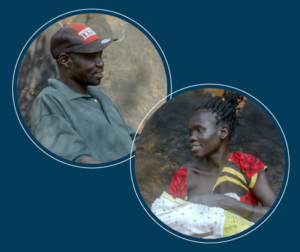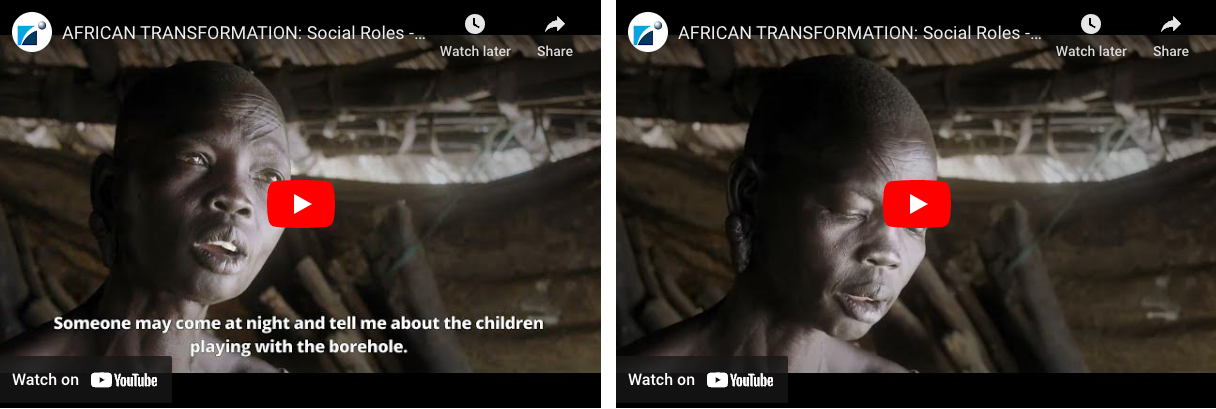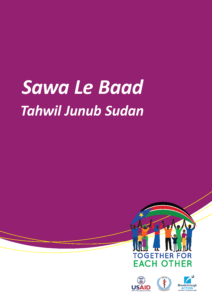Sawa Le Baad: Tahwil Junub Sudan (Together for Each Other: Transforming South Sudan) promotes gender equity, participatory development, and community action by bringing women and men together to explore and discuss how various aspects of gender impact their well-being. This includes discussing harmful and positive social norms and expectations as well as assumptions around gender roles and responsibilities. Through these discussions, existing norms are identified and challenged.
Behavioral Objectives
- Promote gender equity, participatory development, and community action
- Engage women and men in a critical exploration of how gender norms operate in their lives (positively and negatively), how to take action to eliminate harmful norms and practices, and how to reconstitute new equitable norms
- Demonstrate equitable communication and decision-making around health
- Model community reflection and dialogue
The modules include:
- Introduction to the Workshop and Key Concepts
- Social Roles
- Traditional and Cultural Norms
- Couples’ Communication/Conflict Resolution
- Gender-Based Violence
- Women’s and Men’s Reproductive Health
- Safe Motherhood
- Water, Sanitation, and Hygiene
How to Use

The toolkit has two main components: one is a series of real personal stories of women, men, and couples who have overcome gender barriers to reach their goals and improve their lives as well as those of their families. These personal stories are available in video and audio versions.
The personal stories are to be used with the Facilitator’s Guide, which leads women and men through a series of exercises and questions to explore the role of social and gender norms in their lives. The personal stories form the centerpiece of each session in the guide and serve to ground the discussion in the reality of people’s lives.
Facilitators Guide
This guide is designed to help people explore thoughts, ideas, and behaviors and make positive changes in their lives using a technique called “participatory learning.” Participatory learning uses facilitation to encourage people to actively participate in their own learning. The role of the facilitator is key to the success of the program and to enabling participants to use their own experiences and knowledge as a basis for solving problems. Therefore, a section of the guide includes a section on training facilitators and strengthening their facilitation skills.
Together for Each Other: Transforming South Sudan Guide
The Together for Each Other: Transforming South Sudan Guide is designed to be used along with the video and/or audio personal stories.
Video and/or Audio Personal Stories
The personal stories, as well as the other activities in the individual sessions, help participants analyze their experiences, learn new information, improve their skills of interaction, and understand and identify opportunities for change.
Stories of Transformation

Social Roles
This video reflects and discusses the different roles and tasks society teaches women and men what they should do. Nyantong Garang is a woman who challenges gender norms through her job as a pump mechanic in her community.
Traditional and Cultural Norms
This video explores cultural practices and norms that affect men and women. Chief Madalina Ihisa Tito is the only female head chief in Eastern Equatoria and is a role model for women and men alike.
Couples’ Communication and Conflict Resolution
This video explores issues around couples’ communication and conflict resolution. Angua and Abdulwahab share how making decisions together and supporting one another leads to harmony in the home and enables their family to thrive.
Gender-Based Violence
This video reflects and discusses violence between partners and identifies ways of addressing and preventing violence. Yar Makuei is a survivor of gender-based violence who stayed in an abusive marriage for the sake of her children and was eventually able to leave and stand on her own.
Women’s and Men’s Reproductive Health
This video reflects on and discusses the different reproductive needs of men and women and the benefits of making decisions together about family planning. Peter and Veronica share how spacing their children has led to improved pregnancy outcomes and better opportunities for their family.
Safe Motherhood
This video explores issues around safe motherhood. Abdulwahab shares how he supports his wife during and after her pregnancy, including by going with her for antenatal visits and sharing household and childcare responsibilities.
Water, Sanitation, and Hygiene
This video explores issues around healthy water, sanitation, and hygiene behaviors and the roles that both women and men play in ensuring improved hygiene and sanitation at the household level and within their communities. Data Gordon advocates with boys and men to raise menstrual hygiene awareness and provides girls and women with menstrual hygiene products.
LEARN MORE
ENGLISH
JUBA ARABIC


